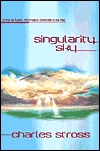
Singularity Sky
Charles Stross
313 pages
published in 2003
Charlie Stross is an English writer currently residing in Scotland, who started writing in the early nineties but was seduced by the glamour of a sysadmin career until recently. He started writing fulltime a few years back and since then has published a steady stream of excellent short stories. Singularity Sky is his first published novel. Full disclosure: he is also someone I occasionally have a pint with.
Singularity Sky is a clever book masquerading as broad farce. Charlie Stross' starting point seems to have been "what if 1905 Tsarist Russia had experienced a full Vingean Singularity". Don't expect the same density of ideas as in his short stories; this is an almost traditional space opera. Almost.
The backstory is that sometime during the 21st century a superhuman intelligence called the Eschaton took the not very liberal step of spreading out roughly 90% of human population over various nearby and not so nearby star systems, together with the warning not to engage in time travel or anything else dodgy that could threaten its existence. This in response to humanity just hitting the interesting part of the Singularity, the part where we could start manipulating really basic physical laws..
One of those involuntary colonies, the socalled New Republic, responded by freezing technology at roughly 19th century levels, with some exceptions. Nuclear powered steam trains, but no phones. Very reactionary, with the broad masses of peasants and workers kept down by church and state, ruled over by the emperor. Any dissidents to this regime are executed, imprisoned or banished to the more backword colonies. It is on Rochard's World, the most backward of these colonies that the inevitable revolution comes -- in the shape of the Festival, a post-singularity, uploaded virtual civilisation willing to trade anything you want for information, stories and entertainment.
The New Republic, thinking this is a military attack, too hidebound to realise what is really going on, mounts a military expedition which is going to use a Clever Trick, which is almost but not quite forbidden by the Eschaton, to gain the upper hand. In the middle of this are Martin Springfield and Rachel Mansour, the former an engineer in charge of a critical upgrade to the New Republic's flagship, the other a UN-accredited diplomat, both from anarchist Earth, both not quite what they seem and both knowing the expedition is doomed one way or other, because it has no idea what its up against. All this while Rochard's World is dragged directly from the 19th century into a full blown singularity.
The themes Stross works here with are not new and can be traced back to writers like Vernor Vinge and Bruce Sterling. The Singularity is something that's almost unknowable, something that will make all the old political and economic rules obsolete. It will be a liberation, but the liberty it offers is not to the liking of everyone, as "everything solid melts into air". There's also more than a hint of cyberlibertarianism. What makes this interesting is the contrast offered by putting this in a thinly disguised sfnal version of Tsarist Russia, which was after all a state that refused to modernise, that desperately clung to its antiquated status quo of a place for everybody and everybody in their place. And because Stross is sensible enough to realise that if this contrast is played straight, it will be utterly boring and predicable, he treats it as a farce.
So you have, e.g. the revolutionaries getting their hands on a Cornucopia machine, which can make everything you think off and having it get stuck on making sporks... Or the way in which these revolutionairies got this machine, by trading it for a "post-Marxist theory of post-technological political economy, and a proof that the dictatorship of the hereditary peerage can only be maintained by the systematic oppression and exploitation of the workers and engineers, and cannot survie once the people acquire the self-replicating means of production" or indeed the fact that after the singularity, the UN was taking over by the internet engineering task force...
In all, this was quite an interesting romp, though not as thought provoking or with the same kind of emotional punch as his short stories. A good start.
